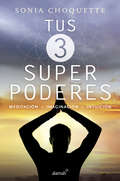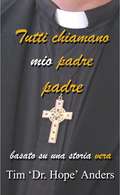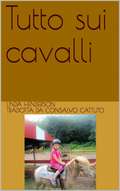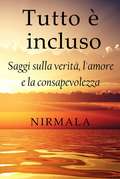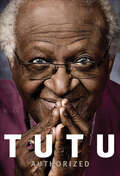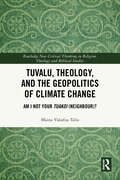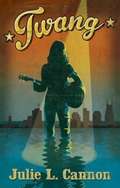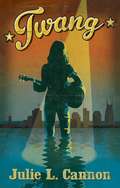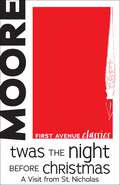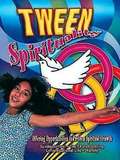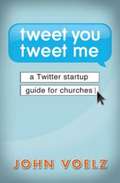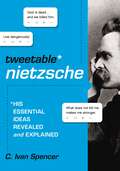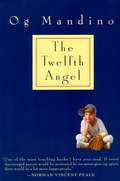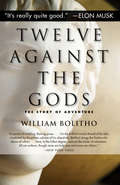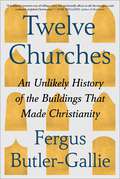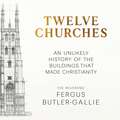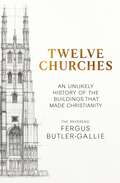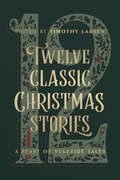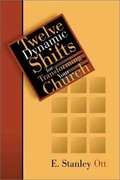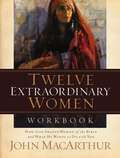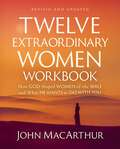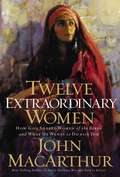- Table View
- List View
Tus 3 superpoderes: Meditación, imaginación, intuición
by Sonia ChoquetteAtrévete a descubrir el poder de la meditación, la imaginación y la intuición para cambiar radicalmente tu vida. Los seres humanos tenemos acceso a tres superpoderes que son innatos en todos nosotros: la meditación, que controla la respuesta a nuestros pensamientos conscientes, lo que nos brinda libertad y paz mental; la imaginación, que desarrolla la capacidad de crear y sentir vidas plenas; y la intuición, que nos permite aprovechar la gracia de un sistema de guía interior que nos lleva a los deseos de nuestro corazón y fuera de peligro. Lleno de historias inspiradoras, este invaluable libro sintetiza la experiencia de Sonia Choquette de trabajar con cientos de clientes durante más de tres décadas para proporcionar técnicas y consejos prácticos que pueden ser fácilmente incorporados en tu rutina diaria.
Tutti chiamano mio padre padre
by Tim 'Dr. Hope' AndersQuesto libro è basato sulla vera storia d'amore della vita dei genitori dell'autore. Sua madre era una talentuosa attrice e produttrice di Brodway e suo padre era un prete cattolico. Una storia complicata e piena di emozioni.
Tutto sui cavalli
by Linda HendersonQuesto libro è scritto per i bambini che amano i cavalli e vorrebbero imparare il più possibile su di loro. Descrive fatti interessanti sulle molteplici razze di cavalli, dove si trovano, cosa amano mangiare, ecc. Ci saranno cavalli in paradiso? Le risposte si trovano in "Tutto sui cavalli". Se ami i cavalli non potrai perderti questo libro!
Tutto è incluso: Saggi sulla verità, l'amore e la consapevolezza
by NirmalaDescrizione del libro: L’Uno è non solo un’esperienza molto profonda e che cambia la vita in modo personale, ma una prospettiva che può trasformare il mondo portando più amore, luce, compassione e verità al mondo stesso. L’Uno ci connette tutti. Ci influenziamo tutti uno con l’altro in ogni momento, e riconoscere questo, in qualunque misura riusciamo a farlo, è trasformativo. Tutto è incluso in questo Uno che tutti i maestri spirituali e tutte le guide illuminate indicano. Nell’abbracciare tutto con una propensione al suo valore e al suo significato essenziali, possiamo andare oltre l’illusione della separazione, verso un semplice riposare nella bellezza e nel mistero di tutta la realtà. Questo libro è una raccolta di articoli e saggi, che indicano continuamente questa unità, e la onnicomprensività della vita. In esso troverete risposta a molte domande comuni poste dai ricercatori, e questo vi aiuterà nella vostra ricerca di maggior pace, amore e comprensione. In questi saggi approfonditi imparerete: Come sapere direttamente quanto qualcosa è vero per voi Come dare amore anche quando qualcuno non vi piace Consigli per la pratica dell’auto-indagine La semplice verità sulla sofferenza e come guarirla Come muoversi verso la Presenza e rimanervi Come superare cattive abitudini e dipendenze La ricchezza intrinseca del vuoto e dello spazio Nota dell’autore: Questo libro è una raccolta di articoli e saggi. Coprono molti argomenti diversi che sono emersi spesso nei quasi vent’anni in cui, come maestro spirituale e mentore, ho condiviso prospettive sulla nostra natura spirituale. Ho incluso anche due appendici, “La saggezza del Cuore” e “L’amore è per dare”, che sono estratti dal mio libro “Vivere attraverso il Cuore”. Queste appendici contengono prospettive che condivido da anni, e consiglio a chiunque non abbia ancora familiarità con questi primi scritti, di leggerli o rileggerli in modo
Tutu: Authorized
by Mpho TutuCommemorating Desmond Tutu's eightieth birthday, this stirring biography commemorates the life, philosophy, faith, and achievements of one of the greatest moral heroes of our time. Written by Allister Sparks, Tutu: Authorized featuring contributions from His Holiness the Dalai Lama, President Barack Obama, and Nelson Mandela, as well as interviews given by Reverend Mpho Tutu, Desmond Tutu’s daughter, to world leaders and public figures including Hillary Clinton, Kofi Annan, Jimmy Carter, Bono, Richard Branson, and F.W. de Klerk. A stirring exploration and graphically rich presentation of one of the world’s most inspirational and altruistic figures, Tutu: Authorized overflows with illuminating revelations about Tutu’s life and resonates with insights into how we can each work to improve peace, fairness, and happiness in the world around us.
Tuvalu, Theology, and the Geopolitics of Climate Change: Am I Not Your Tuakoi (Neighbour)? (Routledge New Critical Thinking in Religion, Theology and Biblical Studies)
by Maina Vakafua TaliaThis book examines the threat posed by climate change to the low-lying islands of Tuvalu through a lens of what it means to be a neighbour. Those who live on Tuvalu are among the most vulnerable in the world to threats of rising sea levels and global climate change. Their carbon emissions are miniscule and they are ‘weak actors’ in terms of the geopolitics of climate change. The task in Tuvalu is to take seriously the prospect of the submergence of islands and the potential for cultural extinction. This prospect raises a network of interconnected questions to do with the rights of climate displaced persons and sovereignty over lands lost to climate change. In this volume, the author draws upon Indigenous knowledge, the ethics of climate justice, insights from climate science and familiarity with discourses surrounding the Anthropocene to explore the implications of the parable of the Good Samaritan. The rhetoric of the question ‘am I not your tuakoi (neighbour)?’ inserts a theological and moral dimension into the complex politics of climate change. The book will be of particular interest to scholars of theology, ethics, ecology and environment, as well as those working in Pacific studies, development studies, and politics.
Twang
by Julie L. CannonTwenty-three-year-old Jennifer Clodfelter believes she is destined to be a country music star. When her passion, determination and homemade demo tape were rejected by every music label in Nashville, she refused to give up. In just three years, a combination of guts and raw talent have propelled her on a journey of fame beyond her best dream. Now Jennifer has all she ever wanted, only to discover that there is a dark side to the glitz and number one hits. She will have to decide whether to sing her pain to a loving audience or find the courage to face the music in the private studio of her heart.
Twang
by Julie L. CannonTwenty-three-year-old Jennifer Clodfelter believes she is destined to be a country music star. When her passion, determination and homemade demo tape were rejected by every music label in Nashville, she refused to give up. In just three years, a combination of guts and raw talent have propelled her on a journey of fame beyond her best dream. Now Jennifer has all she ever wanted, only to discover that there is a dark side to the glitz and number one hits. She will have to decide whether to sing her pain to a loving audience or find the courage to face the music in the private studio of her heart.
Twas the Night before Christmas: A Visit from St. Nicholas (First Avenue Classics ™)
by Clement Clarke MooreIt's a quiet Christmas Eve. The snow is fresh and white, the kids are tucked in and dreaming, and even the mice are snug in their homes. But wait—what's that clatter? This classic Christmas poem was first published anonymously in a newspaper 1823, and it later appeared in an anthology of poetry from the American author Clement Clarke Moore in 1844. This unabridged version from a 1912 edition includes color illustrations from American artist Jessie Willcox Smith.
Tween Spirituality
by Marcia StonerA book for teachers and leaders of tweens with articles on spirituality and specific activities to nourish spiritual habits in preteens through Sunday school, worship, and other church settings. Included is a photocopiable section for leaders to use with parents to help parents understand what is appropriate in the spiritual realm for their preteens. Includes activities that can be used within existing programs, ideas for including preteens fully in the life of the entire congregation, details on how to form a "Buddy Class" with another church group, and provides suggestions for teaching tweens how to actively participate in leading group worship experiences. Click here for more information about Tweens curriculum.For updated information and fun for your Tweens, visit us online at www.tweenslive.com.
Tweet You Tweet Me - eBook [ePub]: A Twitter Startup Guide for Churches
by John VoelzJumping into the world of Twitter can be a little frightening at first. It’s not that it’s difficult to set up an account, but it can seem everyone who is already on Twitter has been given a secret decoder ring. The rules are quite simple really, and the benefit once trained is tremendous. Use this handy starter guide, written in Voelz’ quirky style as a set of Frequently Asked Questions, to get started.For a more complete view of social networking in ministry, read Follow You Follow Me: Why Social Networking Is Essential To Ministry, by John Voelz (Abingdon, 2012).
Tweetable Nietzsche: His Essential Ideas Revealed and Explained
by C. Ivan SpencerFriedrich Nietzsche radically confronted Western culture, morality, and social mores, until his death in 1900. Occupying a first-rank position as a thinker, his thought later inspired numerous movements that weave the tapestries of contemporary culture: existentialism, theology, nihilistic culture, Nazism, twentieth century film and art, atheism, ethical egoism, deconstruction, the hermeneutics of suspicion, and the postmodern age. Nietzsche’s incalculable sway on our culture persists to this day. Even his acerbic criticism of Christianity has affected the religion. But many people remain unaware of the pervasive attitudes Nietzsche disseminated, attitudes they echo. His stark prophecy that “God is dead, and we killed him” thrives in this accelerating secular age where postmodernists lionized him as a prophetic voice of a new era. Tweetable Nietzsche introduces and analyzes the worldview of Friedrich Nietzsche. Nietzsche’s tweets, 140 characters or less, provide readers a distilled essence of every major aspect of his worldview. Each tweet illustrates some aspect of his worldview contributing toward a full-orbed understanding of Nietzsche’s thought.
Twelfth Angel
by Og Mandino"A very special story about life and love and courage."MERLIN OLSEN, SPORTSCASTERJohn Harding had a high-powered career, a loving wife, and a beautiful son. He's lost it all and has returned to his home town of Boland, New Hampshire, teetering on the brink of suicide. But an old friend asks John to manage his old Little League team, the Angels. Reluctantly, he agrees, and meets a hopeless player who bears a striking resemblance to his dead son--and through their extroardinary relationship, John finds the wisdom in living that he thought had slipped beyond his grasp forever....AN ALTERNATE SELECTION OF THE LITERARY GUILDFrom the Paperback edition.
Twelve Against the Gods: The Story of Adventure
by William BolithoAn instant bestseller when first published in 1929—biographies of twelve bold individuals from history and what they did to separate themselves from the pack. In his trademark journalist style, author William Bolitho details the lives of twelve great adventurers—Alexander the Great, Casanova, Christopher Columbus, Mahomet, Lola Montez, Cagliostro (and Seraphina), Charles XII of Sweden, Napoleon I, Lucius Sergius Catiline, Napoleon III, Isadora Duncan, and Woodrow Wilson. Bolitho elucidates both the struggles and successes that made these figures so iconic, and demonstrates how they all battled convention and conformity to achieve enduring fame and notoriety. &“We are born adventurers,&” Bolitho writes, &“and the love of adventures never leaves us till we are very old; old, timid men, in whose interest it is that adventure should quite die out. This is why all the poets are on one side, and all the laws on the other; for laws are made by, and usually for, old men.&” Though his essays are nearly one hundred years old, they encompass the timeless values of perseverance, bravery, and strength of spirit that have proven to resonate with the pioneers and thought leaders of today.&“It&’s really quite good.&” —Elon Musk&“Twelve Against the Gods provides an interesting perspective on what drove and impeded this group of adventurers . . . A good read for anyone who&’s interested in history or looking to find some motivation to switch things up and break the rules.&” —Áine Cain, Business Insider&“I think Twelve Against the Gods is also very appropriate for this day and age. We need adventurers, and there still are a lot of adventurers.&” —China Ryall, daughter of William Bolitho
Twelve Churches: An Unlikely History of the Buildings That Made Christianity
by Reverend Fergus Butler-GallieKaren Armstrong meets Pico Iyer in this sweeping history of Christianity that visits a dozen places of worship on every inhabited continent to tell their often wild stories and examine their sometimes difficult legacies.Christianity is the largest religion in the US with upwards of 200 million people, and its churches often possess an allure and beauty that fascinate even the most committed atheist. What fascinates Fergus Butler-Gallie is that each place of worship tells a story—of place, time, and most of all, people. It is in these sanctuaries that the complexities of life from birth and death to power, sex, violence, justice, and beauty are encapsulated, and here, in Twelve Churches, Butler-Gallie takes us on a fascinating journey through time to unravel the story of Christianity as told by the people who have lived it on every inhabited continent. Beginning with the birth of Christ over 2,000 years ago in Bethlehem at the location marked by the Church of the Nativity—a confusing warren of a building—Butler-Gallie leads us to a remote stone outcrop in Mount Athos, Greece, where the monastic vow of celibacy is taken to an optimistic extreme by excluding all female animals. We learn that at Canterbury Cathedral, the stones have been soaked in blood that is both famous and infamous. On the coast of Japan, a cave like church marks the spot where Christian martyrs were tied to crosses at low tide—and left there. The 16th Street Church in Birmingham, Alabama, remains the site of one of the Ku Klux Klan&’s most infamous bombings, and the meeting house in Salem, Massachusetts, remains a monument to the ways that a quest for purity can lead to mass murder. And in Nigeria we visit a church the size of an airplane hangar, where every Sunday it fills almost every one of its 50,000 seats. An engaging blend of history, geography, travel, biography, spiritual reflection, and a wry sense of humor, Butler-Gallie shows us that despite its complexities and controversy, such a faith is still worth following, and that by acknowledging the past we can ultimately discover the path toward healing and hope.
Twelve Churches: An unlikely history of the buildings that made Christianity
by Fergus Butler-Gallie'brilliantly inventive'. - Tom Holland'learned, highly informative and readable'. - Literary Review'thoughtful, humane and open-minded'. - Kirkus Reviews'A brilliant book'. - Library Journal'witty writing'. - The Times***With his trademark reverence and revelry, The Revd. Fergus Butler-Gallie travels through time and place to get to the heart of the religion he is so passionate about. In this book he takes us from Bethlehem and the birth of Christ some 2000-odd years ago, to the immediate present and future of Christianity. He brings together a Baptist Church in the segregationist American South with a medieval monastery in the heart of the Greek countryside; the Vatican - beautiful, imposing, vainglorious, the seat of Catholicism - with a sparse, tiny private church above the rocky coastline of Southern Japan. Twelve Churches is a quest for a new people's history of Christianity, told through the stories of twelve churches scattered across the globe. Through a patchwork of interlinking and varied human stories, Butler-Gallie takes us on a physical and historical journey, exploring the role of hope, faith and beauty in Christianity, but also its fraught relationships with sex, violence and power. The story of Christianity is, he shows, the story of our modern world: it's a story of who we should be, as well who we sometimes are.
Twelve Churches: An unlikely history of the buildings that made Christianity
by Fergus Butler-Gallie'brilliantly inventive'. - Tom Holland'learned, highly informative and readable'. - Literary Review'thoughtful, humane and open-minded'. - Kirkus Reviews'A brilliant book'. - Library Journal'witty writing'. - The Times***With his trademark reverence and revelry, The Revd. Fergus Butler-Gallie travels through time and place to get to the heart of the religion he is so passionate about. In this book he takes us from Bethlehem and the birth of Christ some 2000-odd years ago, to the immediate present and future of Christianity. He brings together a Baptist Church in the segregationist American South with a medieval monastery in the heart of the Greek countryside; the Vatican - beautiful, imposing, vainglorious, the seat of Catholicism - with a sparse, tiny private church above the rocky coastline of Southern Japan. Twelve Churches is a quest for a new people's history of Christianity, told through the stories of twelve churches scattered across the globe. Through a patchwork of interlinking and varied human stories, Butler-Gallie takes us on a physical and historical journey, exploring the role of hope, faith and beauty in Christianity, but also its fraught relationships with sex, violence and power. The story of Christianity is, he shows, the story of our modern world: it's a story of who we should be, as well who we sometimes are.
Twelve Classic Christmas Stories: A Feast of Yuletide Tales
by Timothy LarsenA feast of great literature—12 Classic Christmas Stories all in one volume!Celebrate this magical season with some of the greatest literary figures in history. The wisdom and warmth of Christmas are wrapped in the stories of beloved and gifted authors such as Charles Dickens, Louisa May Alcott, O. Henry, G. K. Chesterton, Willa Cather, Conan Doyle, Washington Irving, George MacDonald, Lucy Maud Montgomery, Anthony Trollope, and other classic storytellers.Not only will you be immersed in the Christmas spirit, but you will draw from the insight of historian Dr. Timothy Larsen who introduces each tale, sharing with readers the history, background, and inspiration behind the literature.This collection invites us to contemplate and savor all that is good and true about God&’s redemptive story and our call to be Christ-like. The stories call us to generosity, reconciliation, and sacrifice. They encourage us to live with joy and gratitude. Hope and wonder abound as gather your family around the fire and read aloud the Twelve Classic Christmas Stories.Increasing our love for great tales and for Christmas, this beautiful hardcover book is the perfect gift.
Twelve Dynamic Bible Study Methods
by Richard WarrenThis book contains twelve methods of Bible study starting with the very simple and working up to the very complex. Most of us will use our own methods of keeping track of our studies in place of the forms suggested by the author, but I believe you will find the instructions in the text to be quite helpful. The appendiappendices of this book should not be overlooked if you need ideas for Bible study.
Twelve Dynamic Shifts for Transforming your Church
by E. Stanley OttThat todays mainline churches are in crisis is apparent; a solution is less obvious. In this constructive new book E. Stanley Ott points a way ahead, describing twelve shifts in philosophy and practice that can help congregations build need-responsive, disciple-growing churches full of life and vigor. Arguing that the weakness of the church today is a loss of personal spirituality and congregational vitality, Ott challenges local churches to discover how to adjust the style of their ministries to attract new people while encouraging current members. Ott examines the characteristics of traditional churches, extols the features of new, transformational churches, and lays out proposals to help established congregations make the transition. Well balanced by an honest assessment of the churchs present and a positive vision for its future, this book is must reading for pastors, church leaders, and members of every congregation.
Twelve Essential Healing Crystals
by Michael GiengerThis first aid guide to treating common ailments focuses on just 12 stones that cover a wide range of applications. The guide shows the reader how to identify the right stone for each ailment - the index lists more than 300 specific complaints, including those that occur frequently, such as: allergies, coughs, headaches, hormonal complaints, minor injuries, sunburn, stomach ache and toothache.This is your own home pharmacy in portable, pocket form.Divided into 12 chapters, one for each stone, the guide explains many illnesses and complaints in clear, concise, understandable language and suggests the appropriate stone for each ailment and how to use it.This practical, handy guide distills the essence of our current understanding of healing with gemstones. The 12 stones selected will help the reader maintain their health and heal both their body and mind.
Twelve Extraordinary Women Workbook
by John F. MacarthurA first-time mother, a prostitute, an introverted young woman, sisters with opposite personalities. Who were these women? Ordinary women for sure, but used by God in ways they never could have imagined . . . made extraordinary because of their life-changing faith in God. Based on the book by pastor and best-selling author John MacArthur, this workbook brings you face-to-face with twelve women whom God chose to bring His message of redemption to the world. In examining the lives of these women, you will discover their struggles and doubts, their fears and failures, their faith and commitment. you will learn how God used these ordinary women in extraordinary ways. And, through their stories, you will discover how God can impact the world through you! Perfect for group or individual study, this workbook includes: Daily Bible readings Engaging and thought-provoking questions and journaling Fascinating and helpful applications for your daily life "Adding to your Scriptural Vocabulary and Understanding" sections Instructions for facilitating your own small group study
Twelve Extraordinary Women Workbook, Revised and Updated: How God Shaped Women of the Bible and What He Wants to Do with You
by John F. MacArthurA childless woman long past childbearing age. A young widow from a foreign land. An elderly widow living at the temple. Two sisters with very different personalities. Most of the women we know from the Bible were unremarkable in and of themselves. They were ordinary, common, and—in some cases—from shockingly low places in society. In each case, what made them extraordinary was a memorable and life-changing encounter with the God of the universe.The Twelve Extraordinary Women Workbook brings you face-to-face with the women of the Bible as you've never seen them before. You'll discover their struggles and doubts. You'll learn about their fears and failures. You'll explore how God used their faith and commitment for His plans. And you'll come to see that if God can work in these ordinary women's lives in such extraordinary ways—He can certainly do the same in your life!Lessons include:Eve: Mother of All LivingSarah: Hoping Against HopeRahab: A Horrible Life RedeemedRuth: Loyalty and LoveHannah: A Portrait of Feminine GraceMary: Blessed Among WomenAnna: The Faithful WitnessThe Samaritan Woman: Finding the Water of LifeMartha and Mary: Working and WorshipingMary Magdalene: Delivered from DarknessLydia: A Hospitable Heart OpenedBased on John MacArthur's bestselling book of the same name, this revised and updated edition of the workbook includes biblical studies of each woman, thought-provoking questions, and life application assignments.
Twelve Extraordinary Women: How God Shaped Women of the Bible and What He Wants to Do with You
by John MacarthurBible teacher John MacArthur offers lessons learned from the lifes of twelve extraordinary biblical women
Twelve Extraordinary Women: How God Shaped Women of the Bible, and What He Wants to Do with You (Thorndike Inspirational Ser.)
by John F. MacarthurThey were ordinary, common, and in some cases shockingly low-caste, yet each was made extraordinary by her life-changing encounter with God. Readers will be challenged and motivated by Twelve Extraordinary Women, a poignant and personal look into the lives of some of the Bible's most faithful women. Their struggles and temptations are the same trials faced by all believers at all ages. Inside this book, best-selling author and Bible teacher John MacArthur shows that the God to whom they were so committed is the same God who continues to mold and use ordinary people today. ir struggles and temptations are the same trials faced by all believers in all ages. And the God to whom they were so committed is the same God who continues to mold and use ordinary people today.
